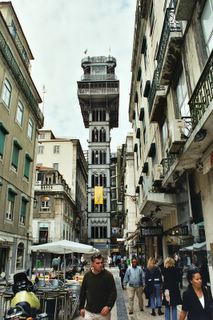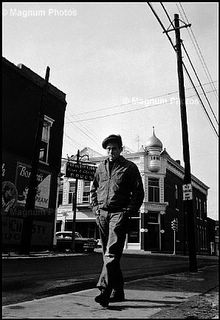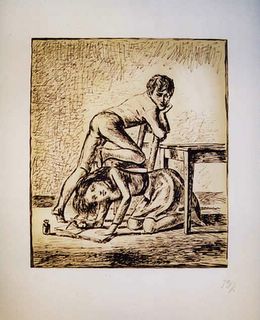
www.pulodolobo.blogspot.com 
De todos os desvios da natureza, o que fez mais pensar, o que pareceu mais estranho a estes meio-filósofos que querem analisar tudo sem nada compreender, dizia um dia a uma das suas melhores amigas a Menina de Villebranche de quem vamos ter ocasião de nos ocuparmos em seguida, é este gosto estranho que mulheres duma certa construção, ou dum certo temperamento, conceberam por pessoas do seu sexo. Embora muito antes da imortal Safo e depois dela não tenha havido uma só região do universo nem uma única cidade sem nos oferecer mulheres com este capricho e embora, perante provas de tal força, parecesse mais razoável acusar a natureza de singularidade do que estas mulheres de crime contra a natureza, nunca todavia se deixou de vituperá-las, e sem o ascendente imperioso que sempre teve o nosso sexo, quem sabe se algum Cujas, algum Bartole, algum Luís IX não teriam imaginado fazer contra estas sensíveis e infelizes criaturas leis iníquas, como as que se lembraram de promulgar contra os homens que, construídos no mesmo gênero de singularidade, e por tão boas razões sem dúvida, julgaram poder bastar-se a si próprios, e imaginaram que a mistura dos sexos, muito útil à propagação, podia muito bem não revestir esta mesma importância para os prazeres. Deus nos livre de tomar qualquer partido a tal respeito... não é, minha cara?, continuava a bela Augustine de Villebranche atirando a esta amiga beijos que pareciam, contudo, um tanto suspeitos, mas em vez de iniquidades, em vez de desprezo, em vez de sarcasmos, todas armas perfeitamente embotadas nos nossos dias, não seria infinitamente mais simples, numa ação tão totalmente indiferente à sociedade, tão igual a Deus, e talvez mais útil do que se acredita na natureza, deixar cada um agir a seu gosto... Que se pode recear desta depravação?... Aos olhos de todo o ser verdadeiramente sensato, parecerá que ela pode evitar maiores, mas nunca se provará que possa conduzir a perigosas... Ah, justos céus, receia-se que os caprichos destes indivíduos de um ou outro sexo façam acabar o mundo, que ponham em leilão a preciosa espécie humana, e que o seu pretenso crime a aniquile, por não proceder à sua multiplicação? Reflita-se um pouco sobre isto e ver-se-á que todas estas perdas quiméricas são inteiramente indiferentes à natureza, que não só não as condena, mas nos prova através de milhares de exemplos que as quer e as deseja; ah, se estas perdas a irritassem, tolerá-las-ia em milhares de casos, permitiria, se a progenitura lhe fosse tão essencial, que uma mulher só pudesse servir para isso durante um terço da sua vida e que ao sair das suas mãos a metade dos seres que ela produz tivessem o gosto contrário a essa progenitura no entanto exigida por ela? Digamos melhor, permite que as espécies se multipliquem, mas não o exige, e bem segura de que terá sempre mais indivíduos do que necessita, está longe de contrariar as inclinações dos que não têm a propagação como uso e que se repugnam de conformar-se a ela. Ah! deixemos agir esta boa mãe, convençamo-nos bem de que os seus recursos são imensos, de que nada que façamos a ultraja e de que o crime que atentaria contra as suas leis nunca estará nas nossas mãos. A Menina Augustine de Villebranche de que acabamos de ver uma parte da lógica, senhora das suas ações com a idade de vinte anos, e podendo dispor de trinta mil libras de rendas, decidira-se por gosto a nunca se casar; o seu nascimento era bom, sem ser ilustre, era filha única dum homem que enriquecera nas índias e morrera sem jamais a ter podido convencer ao casamento. Não o devemos dissimular, muito entrava desta espécie de capricho, de que Augustine acabava de fazer a apologia, na repugnância que testemunhava pelo himeneu; seja conselho, seja educação, seja disposição de órgão ou calor de sangue (nascera em Madras), seja inspiração da natureza, seja tudo o que se quiser enfim, a Menina de Villebranche detestava os homens, e totalmente entregue ao que os ouvidos castos entenderão pela palavra safismo, só encontrava volúpia com o seu sexo e só se satisfazia com as graças do desprezo que sentia pelo Amor. Augustine era uma verdadeira perda para os homens; alta, feita para ser pintada, os mais belos cabelos castanhos, o nariz um pouco aquilino, os dentes soberbos, e olhos duma expressão, duma vivacidade... a pele duma delicadeza, duma brancura, todo o conjunto numa palavra duma espécie de volúpia tão atraente... que era bem certo que vendo-se tão feita para dar amor e tão determinada a não o receber, podia muito naturalmente escapar a muitos homens um número infinito de sarcasmos contra um gosto, aliás muito simples, mas que privando, apesar disso, os altares de Safo duma das criaturas do universo mais bem feitas para os servir, devia necessariamente indispor os sectários dos templos de Vênus. A Menina de Villebranche ria satisfeita de todas estas censuras, de todos estes maus propósitos, e nem por isso se entregava menos aos seus caprichos. A mais elevada de todas as loucuras - dizia ela -, é envergonharmo-nos das inclinações que recebemos da natureza; e fazer pouco dum qualquer indivíduo que tem gostos singulares, é absolutamente tão bárbaro como o seria mofar dum homem ou duma mulher saído zarolho ou coxo do seio da mãe, mas insinuar estes princípios razoáveis a néscios é empreender parar o curso dos astros. Existe uma espécie de prazer para o orgulho em rir dos efeitos que não se tem, e estes gozos são tão doces ao homem e particularmente aos imbecis, que é muito raro vê-los renunciar-lhes... Isso provoca, aliás, maldades, frios ditos de espírito, fracos trocadilhos, e para a sociedade, ou seja para uma coleção de seres que o tédio junta e que a estupidez modifica, é tão doce falar duas ou três horas sem nada dizer, tão delicioso brilhar à custa dos outros e anunciar estigmatizando-o um vício que se está muito longe de ter... é uma espécie de elogio que se pronuncia taticamente sobre si mesmo; por este preço consentem até em se unir aos outros, em fazer cabala para esmagar o indivíduo cujo grande erro é o de não pensar como o comum dos mortais, e retiram-se para casa inchados do espírito que mostraram, quando só provaram radicalmente por uma tal conduta pedantismo e tolice. Assim pensava a Menina de Villebranche e muito afirmativamente decidida a nunca se constranger, rindo-se dos preconceitos, bastante rica para se bastar a si própria, acima da sua reputação, visando epicuriamente uma vida voluptuosa e de modo algum as beatitudes celestes nas quais acreditava muito pouco, ainda menos uma imortalidade demasiado quimérica para os seus sentidos, rodeada por um pequeno círculo de mulheres pensando como ela, a querida Augustine entregava-se inocentemente a todos os prazeres que a deleitavam. Tivera muitos apaixonados, mas todos tinham sido tão maltratados, que se estava enfim em vésperas de renunciar a esta conquista, quando um jovem chamado Franville, pouco mais ou menos da sua categoria social e tão rico como ela, tendo ficado loucamente amoroso, não só não se desgostou com os seus rigores mas determinou-se mesmo muito seriamente a não abandonar a praça enquanto ela não fosse conquistada: participou o seu projeto aos amigos, riram-se dele, manteve que conseguiria, desafiaram-no e ele tentou. Franville tinha dois anos a menos do que a Menina de Villebranche, ainda quase nenhuma barba, uma linda figura, as feições mais delicadas, os mais belos cabelos do mundo; quando o vestiam de moça, ficava tão bem neste trajo que enganava sempre os dois sexos, e várias vezes recebera, de uns por engano, de outros conscientes do que faziam, uma quantidade de declarações tão preciosas, que poderia no mesmo dia tornar-se o Antínoo de qualquer Adriano ou o Adónis de qualquer Psiqué. Foi assim vestido que Franville imaginou seduzir a Menina de Villebranche; vamos ver como se houve. Um dos maiores prazeres de Augustine era vestir-se de homem no carnaval, e correr todas as assembléias sob este disfarce tão análogo aos seus gostos; Franville que fizera espiar os seus passos e tivera até aí a precaução de muito pouco se lhe mostrar, soube um dia que aquela que adorava devia ir nessa mesma noite a um baile dado por associados da Ópera, onde todas as máscaras podiam entrar, e que seguindo o uso desta encantadora moça, ela estaria de capitão de dragões. Disfarça-se de mulher, faz-se embelezar, compor com toda a elegância e todo o cuidado possível, põe muito pó de arroz, sem máscara, e seguido duma das suas irmãs muito menos bela do que ele, entra assim na assembléia onde a amável Augustine apenas ia procurar aventuras. Franville não dera três voltas à sala quando foi logo distinguido pelos olhos conhecedores de Augustine. Quem é esta bela moça? - disse a Menina de Villebranche à amiga que a acompanhava. - Parece-me que nunca a vi em parte nenhuma, como pôde pois escapar-nos uma tão bela criatura? E mal estas palavras são ditas, Augustine faz tudo quanto pode para entabular conversa com a falsa Menina de Franville que primeiro foge, volteia, evita, escapa e tudo isso para se fazer desejar mais ardentemente; por fim dá-se o encontro, as impressões vulgares mantêm de início a conversa que, pouco a pouco, se torna mais interessante. - Está um calor horrível no baile - disse a Menina de Villebranche -, deixemos asnossas companheiras juntas e vamos tomar um pouco de ar nestes gabinetes onde jogamos e nos refrescamos. - Ah! Senhor - disse Franville à Menina de Villebranche continuando a fingir tomá-la por um homem -, na verdade, não me atrevo, apenas tenho aqui a minha irmã, mas sei que a minha mãe deve vir com o esposo que me destina, e se uma ou outro me vissem consigo, seria um sarilho... - Bom, bom, é preciso sobrepor-se a todos esses terrores de criança... Que idade tem, belo anjo? - Dezoito anos, senhor. - Ah! Respondo-lhe que aos dezoito anos se deve ter adquirido o direito de fazer tudo o que se quiser... vamos, vamos, siga-me e nada tema... - e Franville deixa-se conduzir. - O quê, encantadora criatura -, continua Augustine, conduzindo o indivíduo que julga ser uma moça para os gabinetes contíguos à sala do baile -, o quê, vai-se casar realmente... como a lastimo... e quem é essa personagem que lhe destinam, um maçador aposto... Ah, como esse homem será afortunado e como gostaria de estar no seu lugar! Consentiria em desposar-me, a mim, diga-o francamente, filha celeste. - Ai de mim, sabe-o Senhor, quando se é jovem seguem-se os movimentos do coração? - Está bem, mas recuse-o a esse homem desprezível, faremos juntos um mais íntimo conhecimento, e se chegarmos a acordo... porque não nos entenderíamos? Não preciso, graças a Deus, de nenhuma autorização... embora só tenha vinte anos, sou senhor dos meus bens e se pudesse inclinar os seus pais a meu favor, talvez antes de oito dias estivéssemos os dois ligados por laços eternos. Assim conversando, tinham saído do baile, e a hábil Augustine, que não levava a sua presa para a envolver nas malhas dum amor perfeito, tivera o cuidado de a conduzir para um gabinete muito isolado, o qual graças às combinações que fazia com os organizadores do baile, tinha sempre o cuidado de reservar. - Oh, meu Deus! - disse Franville, logo que viu Augustine fechar a porta deste gabinete e apertá-lo nos braços. - Oh, meu Deus, que pretende fazer?... Uma entrevista a sós, Senhor, e num lugar tão retirado... deixe-me, deixe-me, suplico-lhe, ou gritarei por socorro. - Vou retirar-te o poder, anjo divino - disse Augustine imprimindo a sua bela boca sobre os lábios de Franville -, grita agora, grita se podes, e o bafo puro do teu hálito de rosa ainda mais incendiará o meu coração. Franville debatia-se muito fracamente: é difícil mostrar cólera quando se recebe assim ternamente o primeiro beijo de tudo quanto se adora. Augustine, encorajada, atacava com mais força, empregava aquela veemência que realmente apenas é conhecida das mulheres deliciosas seduzidas por esta fantasia. Em breve as mãos passeiam, Franville representando a mulher que cede, deixa igualmente vaguear as suas. Toda a roupa se afasta, e os dedos chegam quase ao mesmo tempo onde cada um deles julga encontrar o que lhe convém... Então Franville mudando subitamente de papel: - Oh, justos céus - exclama -, com que então não passa duma mulher... - Horrível criatura - disse Augustine pondo a mão sobre coisas cujo estado não pode sequer permitir a ilusão -, dei-me eu tanto trabalho para achar um desprezível homem... é preciso ser muito infeliz. - Na verdade não mais do que eu - disse Franville, arranjando-se e mostrando o mais profundo desprezo -, uso o disfarce que pode seduzir os homens, amo-os, procuro-os, e só encontro uma p... - Oh, p..., não - disse azedamente Augustine -, nunca o fui em toda a minha vida, não é quando se abomina os homens que se pode ser tratada dessa maneira - Como, é mulher e detesta os homens? - Sim, e isso pela mesma razão que o senhor é homem e abomina as mulheres. - A coincidência é única, eis tudo o que se pode dizer. - É bem triste para mim - disse Augustine com todos os sintomas do mau humor mais marcado. - Na verdade, Menina, é ainda mais fastidiosa para mim - disse amargamente Franville - eis-me manchado para três semanas; sabia que na nossa ordem fazemos voto de nunca tocar numa mulher? - Parece-me que podem sem se desonrarem tocar numa como eu. - Por minha fé, minha bela - continua Franville -, não vejo que haja grandes motivos para excepção e não acho que um vício lhe possa merecer um mérito a mais. - Um vício... mas é o senhor quem reprova os meus... quando possui outros tão infames? - Olhe - disse Franville -, não nos querelemos, estamos os dois metidos no jogo, o melhor é separarmo-nos e nunca mais nos vermos. E dizendo isto Franville preparava-se para abrir as portas. - Um momento, um momento - disse Augustine, impedindo-o de abri-las -, vai divulgar a nossa aventura a toda a terra, aposto. - Talvez me divirta a fazê-lo. - De resto, que me importa, graças a Deus estou acima dos murmúrios, saia, Senhor, saia e diga tudo o que lhe agradar... - E detendo-o uma vez mais -: Sabe - disse sorrindo -, que esta história é muito extraordinária... enganámo-nos os dois. - Ah! o erro é muito mais cruel - disse Franville - para as pessoas com o meu gosto do que para as que têm o seu... e este vazio causa-nos repugnância... - Por minha fé, meu caro, creia que o que me oferece nos desagrada pelo menos tanto; vamos, a repugnância é idêntica, mas a aventura é deveras divertida, temos de concordar? Volta ao baile? - Não sei. - Por mim não volto mais - disse Augustine -, fez-me sentir coisas... desgostou-me... vou-me deitar. - Já não era sem tempo. - Mas tenha ao menos a delicadeza de me emprestar o seu braço até minha casa, habito a dois passos, não tenho o meu coche, não me vai deixar ficar aqui. - Não, acompanhá-la-ei de boa vontade - disse Franville -, os nossos gostos não nos impedem de ser correctos... quer a minha mão?... Ei-la. - Só aproveito porque não encontro melhor por agora. - Fique bem certa que por mim só lha ofereço por delicadeza. Chegam à porta da casa de Augustine e Franville prepara-se para se despedir. - Na verdade, o senhor é delicioso - disse a Menina de Villebranche -, com que então deixa-me na rua. - Mil perdões - disse Franville -, não ousava. - Ah, como são bruscos estes homens que não gostam das mulheres! - É que eu - disse Franville, dando todavia o braço à Menina de Villebranche até ao seu apartamento -, é que eu, Menina, gostava de voltar depressa ao baile para reparar a minha tolice. - A sua tolice, sente-se então muito aborrecido por me ter encontrado? - Não digo tanto, mas não é verdade que podíamos ambos ter achado infinitamente melhor? - Sim, tem razão - disse Augustine entrando enfim em casa -, tem razão, senhor, eu sobretudo... porque receio bastante que este funesto encontro venha a custar a felicidade da minha vida. - O quê, não está então bem segura dos seus sentimentos? - Ontem estava-o. - Ah! não acredita muito nas suas máximas. - Não acredito em nada, está a enervar-me. - Está bem, eu saio, Menina, eu saio... Deus me livre de a incomodar durante mais tempo. - Não, fique, ordeno-lhe, poderá uma vez na vida obedecer a uma mulher? - Eu - disse Franville sentando-se por condescendência -, nada há que não faça, já lho disse, sou educado. - Sabe que é horrível de na sua idade ter gostos tão perversos? - Julga que seja decente de na sua os ter tão singulares? - Oh, é muito diferente, nós, é recato, é pudor... é orgulho mesmo se o preferir, é o receio de se entregar a um sexo que só nos seduz para nos dominar... Todavia os sentidos falam e arranjamo-nos entre nós; se tudo dissimulamos bem revestimo-nos dum verniz de discrição que muitas vezes se impõe, assim fica a natureza contente, observa-se a decência e os costumes não se sentem ultrajados. - Eis o que se chamam belos e bons sofismas, por esse caminho tudo justificaríamos; e que disse afinal que nós não possamos igualmente alegar em nosso favor? - Absolutamente nada, com preconceitos tão diferentes não devem ter os mesmos pavores, o vosso triunfo está na nossa derrota... quanto mais multiplicam as vossas conquistas, mais acrescentam a vossa glória, e não podem recusar-se aos sentimentos que fazemos nascer dentro de vós, a não ser por vício ou depravação. - Na verdade, creio que me vai converter. - Gostaria. - Que ganharia com isso, continuando no erro? - É um favor que o meu sexo me ficará a dever e como amo as mulheres, sinto-me feliz por trabalhar para elas. - Se o milagre acontecesse, os seus efeitos não seriam tão gerais como parece acreditar, eu só me converteria por uma única mulher quando muito a fim de... experimentar. - O princípio é honesto. - É que é bem certo haver um pouco de receio, sinto-o, em tomar um partido sem ter provado de tudo. - O quê, nunca viu uma mulher? - Nunca, e a Menina... acaso possuíra primícias tão seguras? - Oh, primícias, não... as mulheres que vemos são tão astutas e ciumentas que não nos deixam nada... mas nunca conheci um homem em toda a minha vida. - E fez uma jura? - Sim, não quero ver nem jamais conhecer senão um tão singular como eu. - Sinto-me desolado por não ter feito a mesma jura. - Não creio que seja possível ser mais impertinente. E dizendo estas palavras, a Menina de Villebranche levanta-se e diz a Franville que se pode retirar quando quiser. O nosso jovem apaixonado sempre de sangue-frio faz uma profunda reverência e apresta-se para sair. - Regressa ao baile - diz-lhe secamente a Menina de Villebranche fitando-o com um despeito misturado com o mais ardente amor. - Claro que sim, já lho disse, parece-me. - Não é assim capaz do sacrifício que por si fiz. - O quê, fez-me algum sacrifício? - Só voltei para casa para não ver mais nada após ter tido a infelicidade de o conhecer. - A infelicidade? - É o senhor que me força a servir desta expressão, só do senhor dependia que eu usasse uma bem diferente. - E como conciliaria isso com os seus gostos? - O que não abandonamos nós quando amamos! - De acordo, mas ser-lhe-ia impossível amar-me. - Isso sucederia se conservasse hábitos tão horríveis como os que em si descobri. - E se renunciasse a eles? - Eu imolaria imediatamente os meus sobre os altares do amor... Ah! pérfida criatura, como esta confissão custa à minha glória, e tu acabas de ma arrancar - disse Augustine em lágrimas, deixando-se cair numa cadeira. - Obtive da mais bela boca do universo a confissão mais lisonjeira que me seria possível ouvir - disse Franville precipitando-se aos joelhos de Augustine. - Ah, querido objecto do meu mais terno amor, reconheça o meu fingimento e digne-se não o punir, é a seus joelhos que imploro a graça e aí ficarei até ao meu perdão. - Vê junto de si, menina, o amoroso mais constante e mais apaixonado; julguei necessário este estratagema para vencer um coração cuja resistência conhecia. Consegui, bela Augustine, recusará ao amor sem vícios o que se permitiu deixar ouvir ao apaixonado culpado... culpado, eu... culpado do que acreditou... ah! acaso supunha que uma paixão impura pudesse existir na alma daquele que só por si se sentiu incendiado. - Traidor, enganaste-me... mas perdoo-te... todavia nada terás para me sacrificar, pérfido, e o meu orgulho será menos lisonjeado, está bem, não importa, por mim sacrifico-te tudo... Vai, renuncio com alegria por te agradar a erros a que a vaidade nos arrasta quase tanto como os nossos gostos. Sinto-o, a natureza vence, abafava-o com extravagâncias que agora detesto com toda a minha alma; não se resiste ao seu império, ela só nos criou para vós, ela só vos formou para nós; sigamos as suas leis, é pela própria voz do amor que ela mas inspira hoje, não me serão por isso menos sagradas. Eis a minha mão, senhor julgo-o homem de honra e em condições de me pretender. Se pude merecer perder um instante a sua estima, à força de cuidados e de ternura repararei talvez os meus erros, e forçá-lo-ei a reconhecer que os da imaginação nem sempre degradam uma alma bem nascida. Franville, todos os seus votos satisfeitos, inundando com as lágrimas da sua alegria as belas mãos que beijava, ergue-se e precipitando-se nos braços que se lhe abrem: - Oh dia mais afortunado da minha vida - exclama -, nada existe de comparável ao meu triunfo, reconduzo ao seio das virtudes o coração onde vou reinar para sempre. Franville beija milhares de vezes o divino objecto do seu amor e separa-se; dá a conhecer no dia seguinte a sua felicidade a todos os amigos; a Menina de Villebranche era um partido demasiado bom para que os seus pais lho recusassem, desposa-a na mesma semana. A ternura, a confiança, a discrição mais escrupulosa, a modéstia mais severa coroaram o seu himeneu, e ao tornar-se o mais feliz dos homens, teve a sabedoria suficiente para fazer da mais libertina das moças a mais prudente e a mais virtuosa das mulheres.
De Sade




















